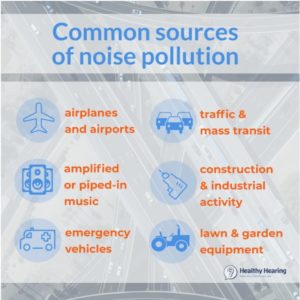You’ve heard of secondhand smoke. It’s time to think of noise pollution as secondhand sound. It’s harmful and nearly unavoidable in most urban areas.
In this article by Joy Victory in Healthy Hearing, Joy shares valuable information about noise pollution in this day and age.
 A screaming child, TV blaring in the living room, a vacuum cleaner, loud music coming from your teen’s bedroom: a busy home can be a source of constant noise. Once you step outside, there’s even more noise pollution. On an average day, you may hear your neighbor’s lawn mower, honking cars, barking dogs, sirens, maybe even ear-shattering sounds of a construction or a work site—a saw, a drill, a jackhammer.
A screaming child, TV blaring in the living room, a vacuum cleaner, loud music coming from your teen’s bedroom: a busy home can be a source of constant noise. Once you step outside, there’s even more noise pollution. On an average day, you may hear your neighbor’s lawn mower, honking cars, barking dogs, sirens, maybe even ear-shattering sounds of a construction or a work site—a saw, a drill, a jackhammer.
Welcome to the modern–and very noisy–world. Unless you live in a quiet rural area, you are no stranger to the phenomenon of environmental noise, commonly called noise pollution.
Secondhand sound is harmful
Noise pollution is often referred to as the “modern unseen plague” for good reason. It may be unseen but certainly not unheard. It disturbs us practically everywhere we go, day and night. And, besides leading to hearing loss, it impacts our physical and mental health, too.
You’ve heard of secondhand smoke. It’s time to think of noise pollution as secondhand sound. It’s harmful and nearly unavoidable in most urban areas.
What is noise pollution?
Noise pollution is a state of excessive noise that “seriously harms human health and interferes with people’s daily activities at school, at work, at home and during leisure time,” according to the World Health Organization (WHO).
How common is noise pollution?
How big of a problem is excess noise? According to the American Speech-Language-Hearing Association (ASHA), an estimated 30 million Americans are exposed to dangerous noise levels on a regular basis, an increase of 10 million from just a few years ago. And, of course, many millions more are impacted by noise pollution worldwide, so it is fair to say that environmental noise is a growing global problem.
Continue reading the full article where they discuss the most common sources of noise pollution, the health effects on noise pollution and how to protect yourself from noise pollution – by Clicking Here.
We are here to help if you or a family member is having any difficulties with hearing, hearing aids, or Tinnitus please give us a call at 727-323-2471 and set up an appointment. We can help you.
Susan E. Terry, Au.D., F-AAA, F-NAP
Doctor of Audiology
Board Certified
P.S. We are here to help if you have any questions about your hearing, feel free to give us a call at 727-323-2471